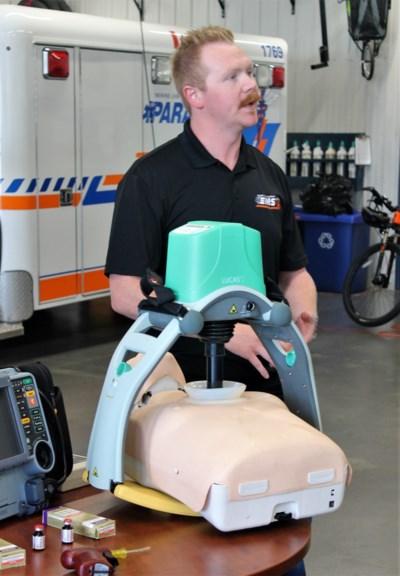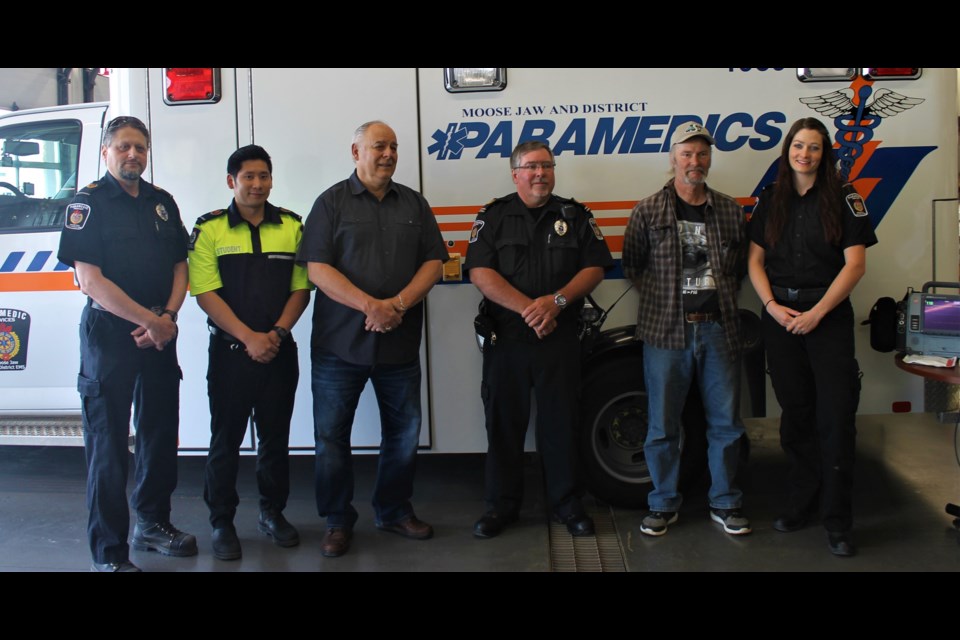For both Gary Downton and Don Dreger, the chance to reunite with the paramedics who helped save their lives was a moment they are grateful to have gotten to have.
“It's very nice, it was a nice reunion here,” said Downton. “I don't want to really see it again, but anybody that makes it through it like this is going to be thankful.”
Just this February, Downton and Dreger each suffered a cardiac arrest, within a week of one another; both were given CPR by a bystander on the scene before being attended to by paramedics and airlifted to Regina by STARS.
An incredible chain of help made their stories ones of success: Downton is currently in the cardiac rehabilitation program at Yara Centre, and Dreger recently celebrated his birthday.
Both men were lucky enough to have a bystander jump into action, performing CPR until an ambulance from Moose Jaw & District EMS arrived, and in Dreger's case, having access to an automated external defibrillator (AED).
Not all cardiac emergencies end this way; the majority of cardiac arrests end in much more somber circumstances, but statistics show that bystander CPR and on-site AEDs can double the chances of survival.
This is the reason why Moose Jaw & District EMS Cheif Kyle Sereda has been encouraging businesses to invest in AED units and register them with 911 services — as emergency dispatchers can locate registered AEDs in times of crisis, which can save a life.
 The crowd gathered got to see a demo of the LUCAS device, which was used to continue compressions during transport on both cardiac calls.
The crowd gathered got to see a demo of the LUCAS device, which was used to continue compressions during transport on both cardiac calls. “Having a defibrillator in public buildings or businesses, where there's lots of public traffic, really makes a difference because an ambulance can take several minutes to arrive,” said Sereda. “Seconds make a difference.”
Moose Jaw & District EMS can help with the acquisition and maintenance of public AEDs and encourages every public building to look into getting one.
“It's just an awareness. We're here to support people who have them. And if you want more information about how to get one, we can help you,” said Sereda.
Jim Madden is an advanced care paramedic who responded on both calls, and he is glad to have a chance to meet with both Downton and Dreger again, in less stressful conditions.
“A lot of times we don't get to do that, so its nice meeting face to face,” said Madden. “My favorite parts are times like this, where you get to actually talk to people who you've impacted their life.”
Primary care paramedics Greg Bishop and Blasia Cain responded to the calls alongside Madden — Bishop to Downton’s call and Cain to Dreger’s call — as well as Sask Polytech student Khiem Nguyen, who joined the crew for both calls.
Stories like these ones are victories for paramedics like Madden and the rest of the crew at Moose Jaw & District EMS, although Madden made clear that his involvement was just one part of a much larger team effort.
Four emergency dispatchers were involved with each call, as well as the paramedics who responded, the bystanders who gave CPR and manned the AED, the hospital staff, and so on.
Madden’s advice to the public, who may be touched by this pair of stories and want to help, is to take a CPR course; be prepared.
“[In these situations,] the better the CPR is done, the recognition of the cardiac arrest, the faster that people can start the CPR, put the AED's on if they're available. . . the outcomes are a lot better,” said Madden.
For Downton, every bit of support he has received — from the day of the incident to his ongoing recovery — is important to him. Having a stranger with CPR knowledge present made a huge difference to him.
“I don't know how he feels about the whole thing either. He probably just helped me and that's it,” said Downton. “For me, it was a pretty good thing.”
Because of public preparedness, both of these men can continue on with their lives — something that all paramedics hope to see when they respond to any call.
“I've got quite a few [surviving patients] out there that I've been able to shake their hands and talk to them after,” said Madden. “So that's — you like it, that's the reason you keep doing it.”




